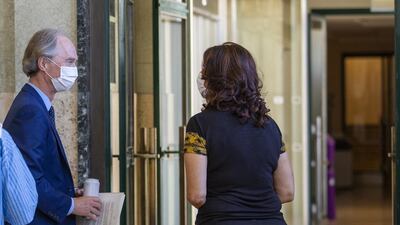Delegations from Syria's government, opposition and society were due to resume meetings in Geneva on Monday to discuss a possible new constitution, but talks were put on hold after three officials tested positive for Covid-19.
The UN mediator considered the talks to be a means of opening the door to a resolution to the country's nine-year civil war.
The UN's special envoy to Syria, Geir Pedersen, is hosting the three, 15-member teams from Syria, with foreign powers such as the US, Russia, Turkey and Iran expected to be on the sidelines during the week-long gathering at the UN offices.
A fragile ceasefire is largely holding in the rebel-held region of Idlib, and Mr Pedersen said last week he was hoping to build trust and confidence in the process that had produced few concrete results so far.
His office did not identify which of the members of the Constitutional Committee were infected.
One third is nominated by the Syrian government, one third by the opposition and one third by civil society.
“Committee members were tested before they travelled to Geneva, and they were tested again on arrival, and the wearing of masks and strict social distancing measures were in place when they met at the Palais des Nations,” the UN said.
“Following a constructive first meeting, the third session of the Constitutional Committee is on hold.
"The office of the special envoy will make a further announcement in due course."
The UN said Swiss authorities were informed and contact-tracing was under way.
The Syrian war broke out in 2011, leading to hundreds of thousands of deaths and the displacement of millions from their homes.
The opposition wants a new constitution drafted, while the government says the current charter should be amended.
It was to be the first meeting of the Syrian delegations in nine months, with the Covid-19 outbreak forcing talks in March to be postponed.
US envoy for Syria James Jeffrey, who is in Geneva, this month noted a "shift at least in tone" from Syrian President Bashar Al Assad, who acknowledged the UN-backed process in ways that he had not previously.
Mr Jeffrey said the US planned to use this week's meeting to assess whether the government changed its approach to the talks "at least tactically".
A larger group of 150 delegates is also part of the process but is not meeting this week.
Mr Pedersen is the fourth UN envoy to try to mediate peace in Syria, where rebels are holding on to a last piece of territory in the north-west.
Fighting has calmed since March when Turkey, which backs some groups opposed to Mr Al Assad, agreed with Russia to a ceasefire.
Mr Pedersen in March said it was a great relief that there had not been more Covid-19 cases in the country, although he issued a warning of a wider spread.
He said the "relative calm" in the last rebel-held enclave of Idlib was an opportunity for building confidence.
Mr Pedersen urged the US and Russia, who support opposing sides, to start talks and back the peace process.
While the US supports the Constitutional Committee as the only pragmatic path to any political change in Damascus, Washington no longer wants the talks to be dominated by Moscow and Ankara.
But the 50-member opposition section of the committee comprises a significant portion of members allied with Moscow.
The rest of the committee is made up of 50 regime representatives and 50 chosen by the UN.
Earlier constitutional talks broke down almost as soon as they started in November, as tension between Moscow and Ankara grew over the Russian-backed campaign by the regime and its militia allies to recapture Idlib.
A Turkish military build-up foiled the campaign, although forces loyal to the Assad regime made major advances and captured motorways.

